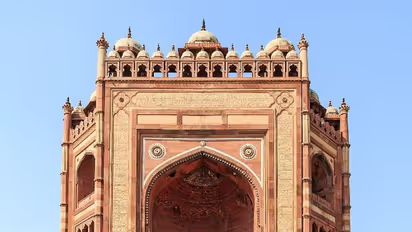‘Traces of Hindu temple found beneath Fatehpur Sikri Dargah’: Agra court accepts lawyer’s application

Synopsis
A lawyer in Agra has presented evidence suggesting a Hindu temple's remnants lie beneath the Fatehpur Sikri Dargah. The court accepted the complaint against the Uttar Pradesh Central Sunni Waqf Board and the Jama Masjid Management Board, alleging unlawful occupation. This dispute reflects wider tensions over religious sites, echoing similar cases like the Bhojashala complex in Madhya Pradesh.
A legal development has emerged from Agra, where a lawyer has presented compelling evidence hinting at the existence of a Hindu temple's remnants beneath the Fatehpur Sikri Dargah. The court's acceptance of the application signals the start of a potentially historic trial.
Ajay Pratap Singh, the diligent lawyer behind this revelation, has formally complained to the Agra Civil Court. The complaint targets the Uttar Pradesh Central Sunni Waqf Board and the Jama Masjid Management Board, alleging their unlawful occupation of the property currently under the jurisdiction of the Archaeology Department of Fatehpur Sikri Dargah.
Delhi: PWD demolishes Hanuman Temple, Dargah in Bhajanpura amid heavy security deployment
The historical significance of Fatehpur Sikri, previously known as Sikri or Vijayapura Sikri, adds weight to the claims. It is believed to have derived its name from a Kshatriya king who once ruled the region. The Dargah, believed to have been constructed over the sacred grounds of Maa Kamakya Devi's temple, was reportedly demolished during the reign of Akbar, and replaced by the current Dargah.
Singh's complaint draws attention to historical references, including those attributed to Babar's era, further substantiating the claim that the temple's existence predates the Dargah.
'Ajmer Dargah is a Hindu temple': Maharana Pratap Sena chief claims in letter to CM Bhajan Lal Sharma (WATCH)
This legal manoeuvre follows a similar pattern observed in other regions of India, where disputes over religious sites have fueled legal battles. Notably, the Madhya Pradesh High Court recently ordered a survey of the Bhojashala complex in Dhar district following a dispute over a mosque allegedly built atop a Hindu temple. The parallels drawn in these cases underscore the complexity and sensitivity surrounding matters of faith and heritage.
The Fatehpur Sikri Dargah controversy, now thrust into the legal spotlight, has the potential to reshape narratives surrounding religious coexistence and historical preservation in India.
Stay updated with the Breaking News Today and Latest News from across India and around the world. Get real-time updates, in-depth analysis, and comprehensive coverage of India News, World News, Indian Defence News, Kerala News, and Karnataka News. From politics to current affairs, follow every major story as it unfolds. Get real-time updates from IMD on major cities weather forecasts, including Rain alerts, Cyclone warnings, and temperature trends. Download the Asianet News Official App from the Android Play Store and iPhone App Store for accurate and timely news updates anytime, anywhere.